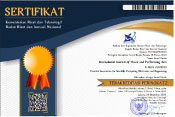*corresponding author
AbstractIndo-Mauritian group cultural hegemony has become a trend in music education in Mauritius. This fact has led to social imbalances and inequality of art education. In this situation, Mauritius needs openness and a new policy of arts education, and this must be taken into account because Mauritius has a diverse population. The problem is how the condition of postcolonial music education affects the art education policy in Mauritius. This study aims to uncover this problem. The approach taken is based on an ethnographic approach using a grounded theory strategy. In a postcolonial context and highly multicultural society, hegemonic forces are at play that promotes the Hindu majority ethnic group (termed the “new colonizersâ€) over all the other ethnic groups. This argument is supported on one side by an analysis of the public music education system, and on the other, by the process of teacher training and certification. An analytic autoethnographic method grounded in a transformative philosophical perspective informs this qualitative research. Results demonstrate a substantial disparity of opportunities for students and prospective music teachers in favor of the Hindu ethnic group. An intercultural perspective on music education in Mauritius is provided that could portray Mauritian nationhood within the public music education system.
KeywordsPostcolonial; Multicultural; Music Education; Mauritius Cultural; Hegemony
|
DOIhttps://doi.org/10.31763/viperarts.v2i2.174 |
Article metrics10.31763/viperarts.v2i2.174 Abstract views : 2420 | PDF views : 916 |
Cite |
Full Text Download Download
|
References
T. J. J. Lears, “The Concept of Cultural Hegemony: Problems and Possibilities,†Am. Hist. Rev., vol. 90, no. 3, p. 567, Jun. 1985, doi: 10.2307/1860957.
A. Ertan, M. Fiszbein, and L. Putterman, “Who was colonized and when? A cross-country analysis of determinants,†Eur. Econ. Rev., vol. 83, pp. 165–184, Apr. 2016, doi: 10.1016/j.euroecorev.2015.10.012.
R. Human and C. van Niekerk, “Assessing ngoma-ness: a generic cross-cultural framework for African musical arts education,†J. Music. Arts Africa, vol. 11, no. 1, pp. 21–35, Jan. 2014, doi: 10.2989/18121004.2014.995434.
N. T. Assieâ€Lumumba, “Cultural Foundations of the Idea and Practice of the Teaching Profession in Africa: Indigenous roots, colonial intrusion, and postâ€colonial reality,†Educ. Philos. Theory, vol. 44, no. sup2, pp. 21–36, Jan. 2012, doi: 10.1111/j.1469-5812.2011.00793.x.
D. O. A. Ogunrinade, “Content analysis of music curriculum for the Nigeria Certificate in Education (NCE),†Muziki, vol. 10, no. sup1, pp. 80–93, Dec. 2013, doi: 10.1080/18125980.2013.852746.
H. C. Metz, “Mauritius: A country study,†in GPO for the Library of Congress, Washington, 1994.
W. F. Miles, “The Creole Malaise in Mauritius,†Afr. Aff. (Lond)., vol. 98, no. 391, pp. 211–228, Apr. 1999, doi: 10.1093/oxfordjournals.afraf.a008008.
J. W. Creswell and J. D. Creswell, Research design: Qualitative, quantitative, and mixed methods approaches. Sage publications, 2017.
H. K. Mohajan, “Qualitative Research Methodology in Social Sciences and Related Subjects,†J. Econ. Dev. Environ. People, vol. 7, no. 1, p. 23, Mar. 2018, doi: 10.26458/jedep.v7i1.571.
C. Ellis, The ethnographic I: A methodological novel about autoethnography, vol. 13. Rowman Altamira, 2004.
C. R. Ronai, “Managing aging in young adulthood: The ‘aging’ table dancer,†J. Aging Stud., vol. 6, no. 4, pp. 307–317, Dec. 1992, doi: 10.1016/0890-4065(92)90014-W.
D. Byczkowska-Owczarek, “Researcher’s personal experiences as a method of embodiment research,†Hexis. Theory, Soc. Cult., vol. 1, no. 1, p. 11, Jul. 2014, doi: 10.15584/hexis.3.
B. L Berg, Qualitative research methods for the social sciences. A Pearson Education Company, 2001.
S. K. Pudaruth, “Indian music and dance for inclusive development: A reflection on the Republic of Mauritius,†J. Transdiscipl. Res. South. Africa, vol. 10, no. 2, pp. 180–192, Nov. 2014, doi: 10.4102/td.v10i2.108.
A. S. Peruman, “The Contribution of Indian Music in Enhancing Intercultural Ties: A Mauritian Perspective.,†Lang. India, vol. 18, no. 10, 2018.
P. Eisenlohr, Little India. University of California Press, 2007. doi: 10.1525/9780520939967.
S. K. Pudaruth, “Indian music and dance for inclusive development: A reflection on the Republic of Mauritius,†J. Transdiscipl. Res. South. Africa, vol. 10, no. 2, pp. 180–192, Nov. 2014, doi: 10.4102/td.v10i2.108.
T. M. Volk, Music, education, and multiculturalism: Foundations and principles. Oxford University Press on Demand, 2004.
M. Clarisse, An Assessment of the National Music Education System at Secondary Level In Mauritius And Recommendations for An Intercultural Approach. University of Sheffield, 2014.
Refbacks
- There are currently no refbacks.
Copyright (c) 2020 Marie Christinne Clarisse

This work is licensed under a Creative Commons Attribution-ShareAlike 4.0 International License.
___________________________________________________________
International Journal of Visual and Performing Arts
ISSN 2684-9259
Published by Association for Scientific Computing Electronics and Engineering (ASCEE)
W: http://pubs2.ascee.org/index.php/viperarts
E: sularso@ascee.org
Organized by:
 This work is licensed under a Creative Commons Attribution-ShareAlike 4.0
This work is licensed under a Creative Commons Attribution-ShareAlike 4.0
























